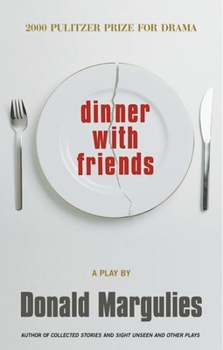Dinner with Friends
Select Format
Select Condition 
Book Overview
Winner of the Pulitzer Prize for Drama, Dinner with Friends is a tender, funny, and insightful look into two marriages.
Format:Paperback
Language:English
ISBN:1559361948
ISBN13:9781559361941
Release Date:September 2000
Publisher:Theatre Communications Group
Length:112 Pages
Weight:0.31 lbs.
Dimensions:0.4" x 5.4" x 8.5"
Customer Reviews
5 ratings
Delicious Script
Published by Thriftbooks.com User , 18 years ago
If you haven't read Dinner With Friends, you won't be disappointed. I thoroughly enjoyed it...great plot, great dialogue, great characters, and a bittersweet ending. Definitely a good choice.
Funny, moving, a must-read!
Published by Thriftbooks.com User , 19 years ago
This is an emotionally charged, witty, and brilliantly told drama of four friends struggling to understand marriage, divorce, intamacy, and each other. One of the best plays I've seen/read.
Real people, real issues, and hard questions.
Published by Thriftbooks.com User , 23 years ago
Donald Margulies' "Dinner with Friends" received the 2000 Pulitzer Prize in Drama, a well-deserved award. The play deals with two couples who have been close for a long time, but now one couple is going through a divorce. Throughout the play, relationships are questioned and reorganized. The still-married couple find themselves assessing the strength of their own relationship and mourning the little corner of their world which dies when their friends divorce. "Dinner with Friends" is a rare gem--a questing, moral play that takes an honest look at the issues of commitment and fidelity in today's world. I don't think I've seen a new play which delved so deep and true into the heart of an everyday issue, and with everyday characters, since David Mamet's "Oleanna." The last two scenes bare the relationships and souls of the characters so fully (and, thankfully, without overt hysterics) that I literally got the chills. In scene three of the second act Gabe meets his friend Tom a few months after Tom and his wife have split. Tom is living with his travel agent girlfriend, and Gabe quickly tires of Tom's rationalizations and his descriptions of the fantasy life he has constructed around himself. Tom talks fanatically about his newfound freedom, and Gabe tells him he's starting to sound "like a Moonie." Gabe finally voices the essential problem he has with Tom's decision to leave his family. Gabe says, "The key to civilization, I think, is fighting the impulse to chuck it all." Then Tom tries to tell Gabe that maybe Gabe's own marriage isn't all that it appears to be; Tom has heard Gabe complain in the past, and Tom says that he knows the signs of trouble. The difference between the two men, however, is that Gabe believes in working at his marriage and cannot imagine ever giving up. "You don't get it," Gabe says. "I _cling_ to Karen; I _cling_ to her. Imagining a life without her doesn't excite me, it just makes me anxious."
Affecting. Modernistic. Real. Sad. Annoying.
Published by Thriftbooks.com User , 23 years ago
The euphoric and blissful bubble that a functioning relationship can father is a wonderful thing. When two individuals are linked by common interests, shared ideals and beliefs, nothing in respects to a career, money or fame can come close to it; it is a wonderful, natural high to experience true love. However, what happens when a marriage does not work and the foundation that eventually led to that marriage was an erroneous one? In Dinner With Friends, playwright David Margulies explores just such a situation.We have two couples, Beth and Tom and Karen and Gabe, all somewhere in their forties and all the best of friends; the former couple, Tom in particular, has grown rather weary about his workaday existence as a lawyer. His energy for life has waned dramatically, and who does he pour his blame on? His artist wife Beth. She in turn blames him for not being open enough. Thus, the blame game starts to take root. The latter couple, Karen and Gabe, get woven into this battle due to their friendship, a friendship that slowly begins to crack when they try to comprehend the depth of their friend's unhappiness, i.e. the banal conversations, the duty of paying off a mortgage, the raising of kids, etc. It is essentially the story of four baby-boomers who do not like the turn their lives are taking. One couple breaks up, and in the process of doing so, they almost develope a 'plastic' or 'artificial' Ken and Barbie personality, that because I'm divorced now I jog more and have better sex. An arrogant happiness developes. That artificiality affects Karen and Gabe deeply, because they debate if their friendship was one of a genuine nature. The good times of the past are no more, so what is there to look forward to?Karen and Gabe are scared at the transition that their 'old' friends took, for if it happened to Tom and Beth, it could happen to anyone. And therein is where the power of this play lies: that divorce can happen to anyone. In its own right the play is smartly written: vibrant, sharp, stinging, fast-paced and edgy. A smart, wry drama about an unpleasant and common issue.
Insight Well Seen
Published by Thriftbooks.com User , 24 years ago
Last season's foursome relationship play, Closer, by Patrick Marber, has many deserving admirers, but I'm partial to Dinner with Friends, and not just for the Pulitzer award, or because it's an American play, not British. What Margulies does so deftly is create individuals, couples, and friendships, all of which are distinct entities ... in a play that shows great insight into my generation's struggle with intimacy. Reading or watching the play I find myself hating the divorcing couple, yet unable to dismiss them. They are fully credible characters, acting out of clearly realized inner needs. I would recomment Donald Margulies' play to anyone who appreciates subtle realsim, peppered with subtle insight and humor.






